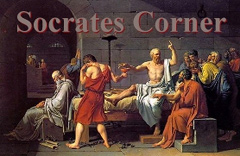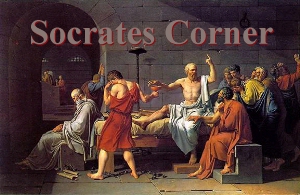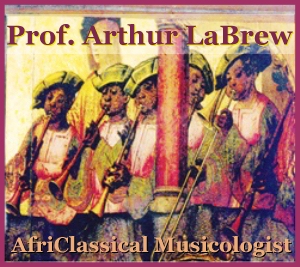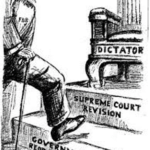On Shakespeare: King Lear, Macbeth and Obama
I am a man more sinned against than sinning.
~ King Lear
But screw your courage to the sticking-place, And we’ll not fail.
~ Lady Macbeth
Prologue
This is part II of my essay on William Shakespeare (1564–1616) the great English playwright, poet, and actor, celebrated as the most outstanding writer in the English language and the world’s greatest dramatist. In this treatment I will compare and contrast two of my favorite classics of Shakespeare: King Lear and Macbeth and place these literary narratives in modern times with the recently defeated U.S. president Barack Obama, a president who behaves not as the chief executive constrained under a constitutional Republic, but as a tyrannical emperor or a lawless king oblivious to reality.
King Lear
King Lear, the aging monarch of Britain, renounces his throne and divides his empire to his three daughters in equal shares. First, King Lear gives his daughters an ordeal (test), probing each to express how much she loves him. Goneril and Regan, Lear’s older daughters, offer their father gratuitous responses which please him. However Cordelia, Lear’s youngest and favored daughter, stands mute, declaring that it impossible to state proper words to define her devotion to her father. Lear becomes enraged and renounces Cordelia as his daughter and heir. However, the king of France is in love with Cordelia and affirms his love despite her having no kingdom (dowry), and she goes with him to France deprived of her father’s blessing.
Lear soon discovers that he made a horrible judgment. The treacherous duplicity of Goneril and Regan is manifested as they quickly conspire to undermine the residual power that Lear still maintains. Delusional to the fact that his beloved daughters are betraying him, Lear loses touch with reality and gradually goes crazy. He escapes his daughters’ houses and aimlessly roams in the countryside finding a place to rest upon a heath during a torrential rainstorm, attended by his Fool and by Kent, a loyal nobleman in disguise.
During this time Gloucester, an ageing nobleman similarly is plagued with family drama. Edmund, his son outside of marriage, deceives him into thinking that Edgar, his legitimate son, has conspired to kill him. Escaping the posse his father sent to arrest him, Edgar cloaks himself in beggar’s clothes referring to himself as “Poor Tom.” Resembling Lear, he joins the king who is still on the heath and becomes his ally against his daughters, however, he is cruelly punished by Reagan and Cornwall who blind him for his treachery and leave him to roam the countryside.
Daughter Cordelia leading a French army invades Dover as part of an attack force to rescue her father. Goneril’s husband, Albany, gradually becomes receptive to Lear’s cause yet the plot thickens as Edmund eventually falls in love with both Regan and Goneril. Goneril and her lover, Edmund conspire to murder Albany but fail. The depressed Gloucester attempts to kill himself, but Edgar protects him through trickery. In the meantime, the English army arrive at Dover, and led by Edmund in a decisive battle, overthrow the Cordelia-led forces of the French army. Lear and Cordelia are apprehended. In the concluding scene, Edgar fights with and kills Edmund; we find out that Gloucester has been killed; Goneril poisons Regan out of suspicion over Edmund and then takes her own life when her betrayal is exposed to Albany; Edmund’s treachery against Cordelia leads to her unnecessary death while in prison; and Lear finally perishes from a broken heart at hearing of the death of his favorite daughter, Cordelia. Albany, Edgar, and the elderly Kent remain and form an alliance to become caretakers of England under a veil of despair and profound sorrow.
King Lear on the Psychiatrist Couch
Shakespeare scholar, Coppélia Kahn offers a psychoanalytic understanding of the “maternal subtext” contained in King Lear to explain the conspicuous absence of actual mothers in the play. Kahn theorizes that Lear, in his old age, degenerates into an infantile nature, and now looks for a devotion that is usually fulfilled by a nurturing mother. Her clinical view of Lear is that of a child being mothered, but without genuine mothers, his children become surrogate mothers, or the daughter-mother figures, particularly Lear’s favorite daughter, Cordelia.
Sigmund Freud believed that Cordelia represents Death. Thus, at the start of the play we find Lear in a rage spurning his daughter, it should be understood as the king repudiating death. Lear is also reluctant to confront the limitations of the human condition. The play’s emotional concluding scene, in which Lear brings the body of his favorite Cordelia, was of profound meaning to Freud. In this scene, she causes in Lear a realization of his human mortality, or as Freud put it, she causes him to “make friends with the necessity of dying.” It is reasonable to suppose that Shakespeare had special motives with Cordelia’s death, for no other setting of King Lear included having Cordelia killed. Goneril and Regan’s Oedipal motives are duplicitous against their father and like Sophocles’ classic play from antiquity, Oedipus Rex, such duplicity and diabolical acts lead to the tragic deaths of all parties involved.
Macbeth
The play starts with the momentary appearance of three witches and then shifts to a military camp, when the Scottish King Duncan learns the news that his generals, Macbeth and Banquo, have conquered two different armed forces – one from Ireland, commanded by the dissident Macdonwald, and one from Norway. After their protracted battle with these rival powers, Macbeth and Banquo come upon three witches. The witches’ vision that Macbeth will be made thane (a position of Scottish aristocracy) of Cawdor and ultimately King of Scotland. Additionally the witches prophesy that Macbeth’s friend, Banquo, will produce a line of Scottish kings, yet ironically Banquo will fail to achieve this rank himself. The witches disappear, and Macbeth and Banquo are skeptical of the Witches’ predictions until some of King Duncan’s men congratulate them for heroic valor in battle and name him thane of Cawdor. Macbeth is fascinated by the chance that the rest of the witches’ prediction – that he will be crowned king – may indeed be truth, however he is fearful about what to anticipate. He calls upon King Duncan, and they have dinner at Macbeth’s castle at Inverness, that evening. Macbeth in a letter to his wife, Lady Macbeth, informs her of every detail.
Lady Macbeth on many levels is the opposite of her husband and replaces Macbeth’s existential doubt and indecision with her Machiavellian call-to-action. Lady Macbeth lusts for the crown for herself, but is content to rule as proxy behind the scenes instructing Macbeth to murder Duncan so as to attain the crown. When Macbeth comes to Inverness, she controls all of her husband’s actions and compels him to assassinate the king that very night. The conspiracy is that he and Lady Macbeth plot to get Duncan’s two chamberlains drunk so they will black out; the next morning they will place the guilt of murder on the chamberlains, who will fail to mount a viable defense, for they will not remember anything. Macbeth stabs Duncan as he lays asleep in bed, plagued by doubts he is cursed by visions including many ghostly warnings and an apparition of a bloody knife. When Duncan’s death is discovered, Macbeth immediately kills the chamberlains the following morning – allegedly out of anger regarding their criminal acts – and shamelessly accepts the crown. Dreading that their father’s murderer will now seek to kill his heirs, Duncan’s sons Malcolm and Donalbain, flee to England and Ireland, as well.
Macbeth employs a gang of assassins to kill Banquo and his son Fleance because he is concerned about the witches’ prophecy that Banquo’s heirs will seize the throne. They trap Banquo and kill him, but Fleance escapes making Macbeth very angry for as long as Fleance is alive, he worries that his authority remains uncertain. That night at the banquet, Banquo’s ghost haunts Macbeth causing an embarrassing scene among the important guests, including many Scottish nobility. Lady Macbeth attempts to counteract the fiasco, but Macbeth’s rule provokes increasing opposition from his aristocrats and subjects. Terrified, Macbeth calls on the witches in their cave. The witches display to him a sequence of demons, spirits and future ominous predictions: he is told that Macduff, a Scottish aristocrat who opposed Macbeth’s rise to the throne is his enemy; he is invincible to being injured by any woman or by any man born of woman; and he will be safe until Birnam Wood comes to Dunsinane Castle. Macbeth is comforted and thinks he is safe, since he deduces that every human being is born by some woman and thus he is like a god…invincible. Discovering that Macduff has escaped to England to join Malcolm, Macbeth commands that Macduff’s castle be seized and, most brutally, that Lady Macduff and her children be killed.
While in England Macduff learns of his family’s death, is filled with anguish and swears revenge. Prince Malcolm, Duncan’s son gathers an army in England, and Macduff allies with him as he moves to Scotland to encounter Macbeth’s forces. The war has the backing of the Scottish aristocrats, who are shocked and horrified by Macbeth’s dictatorial and murderous acts. Lady Macbeth, is like her husband also tormented with hysterics of sleepwalking causing her to despair what she imagines to be bloodstains on her hands – Out, damned spot! Out, I say! Before Macduff confronts Macbeth, he discovers that Lady Macbeth committed suicide which sends him into an almost catatonic state of despair. Notwithstanding, he anticipates the English and reinforces Dunsinane as his last line of defense; arrogant in the assurance that the witches’ predictions will assure his invincibility. However, at this point Macbeth is overcome with fear when he discovers that the English forces are invading Dunsinane protected with branches cut from Birnam Wood, thus, half of the witches’ prophecy has become fulfilled since Birnam Wood is truly coming to Dunsinane.
As the battle rages, Macbeth slashes wildly, yet the English armies slowly overpower his army and seize his beloved castle. As a final end to Macbeth’s tyrannical rule, while in battle his avowed enemy, Macduff proclaims that Macbeth was not “of woman born” but was instead “untimely ripped” from his mother’s womb. Macbeth, though he is transfixed by his realization that he is doomed as the final half of the witches prophecy is fulfilled, yet he carries on the battle until Macduff kills him and cuts off his head. Malcolm, now the King of Scotland, pronounces his generous intentions upon England and invites everyone to witness his coronation at Scone.
Epilogue to King Lear, Macbeth and Obama
Immediately, almost on cue after Republicans took the largest majority in both houses of Congress since 1929 when Hoover was president, Obama strutted out in front of his handpicked Democrat Socialist Party “media” for a press conference which was full of defiance, arrogance, and megalomania on a Shakespearean level. Yet few people realize Obama never makes a move without consulting his cabal of female advisors who conservative intellectual Michael Savage calls “The Four Horsemen of the Apocalypse” – Valerie Jarrett, Michelle Obama, Susan Rice, and Samantha Power. These women are all hard-core, socialist radicals and modern-day Lady Macbeths – duplicitous, self-willed, bloody, conniving women who are daily whispering in the ear of a weak, tyrannical and psychotic Macbeth, or like the treasonous daughters, Goneril and Regan whispering in the ear of King Lear (Obama). These Harpies have for decades written his policy directives and crafted the poisonous words on his ubiquitous teleprompter. Words of lies, deceit, infamy and treachery that unconstitutionally holds Obama up as king or emperor of America, therefore Obama foolishly thinks that he never needs to defer to Congress or to the Supreme Court; to share power with no one…for Obama is a law onto HIMSELF! It reminded me of the scene where Lady Macbeth challenges Macbeth to commit to the plan to murder King Duncan by uttering these diabolical words of treason – But screw your courage to the sticking-place, And we’ll not fail.
Read the Macbeth/King Lear rantings of a psychotic U.S. President whose feckless, unconstitutional policies hijacked a great nation for six years; polices that were in last weeks’ election overwhelmingly rejected by the voters to such a degree as to set the Democrat Socialist Party back nearly 100 years: “I don’t want to try and read the tea leaves on election results,” Obama said the day after his historic losses in Congress. “If you send me a [amnesty for illegal aliens] bill that I can sign, executive actions go away.”
*N.B.: This essay is based in part on ideas from Encyclopedia Britannica Great Books of the Western World, Robert Maynard Hutchins, Editor-in-Chief (University of Chicago, 1952), Vol. 2, Chap. 35 – Honor; Vol. 3, Chap. 73 – Prudence; Vol. 27 – Shakespeare II.
Book Notice
It’s been 5 years since publishing my last book and now I’ve published two new volumes – THE PROGRESSIVE REVOLUTION (University Press of America, 2013):
Vol. 1 @ https://rowman.com/ISBN/9780761861102
Vol. 2 @ https://rowman.com/ISBN/9780761861126
However, before the book is officially released to the public I have to place 100 pre-publication orders (50 orders per each volume). I need your help to make this happen ASAP. Please place your order today for volumes 1 & 2. Of course if you can order all 100 copies today, the book will become official tomorrow.
Please circulate this flyer to all your email contacts & Facebook/Twitter followers who may be interested in reading this opus. Thanks in advance to all my friends, associates and colleagues for your valuable support!
I am starting a new a program on
my blog dedicated to giving young conservatives (ages 14-35) a regular place to display and publish their ideas called Socrates Corner. If you know of any young person who wants to publish their ideas on any subject, have them send their essay manuscripts to my email atewashington@wnd.com.
© Ellis Washington
Category: Commentary
















